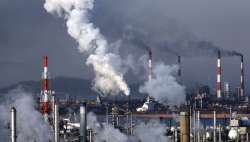Carbon dioxide emissions are costing the Indian economy up to USD 210 billion every year, according to a global study which found that the country is likely to suffer highest economic damage from climate change after the US.
Previous research has focused on how rich countries benefit from the fossil fuel economy, while damages accrue primarily to the developing world.
However, researchers from University of California San Diego in the US found that the top three counties with the most to lose from climate change are US, India and Saudi Arabia.
"The economic damages model indicates that as temperature rises, economic growth in India will slow," Katharine Ricke, an assistant professor at UC San Diego, told PTI.
Researchers estimated country-level contributions to the social cost of carbon (SCC) using recent climate model projections, empirical climate-driven economic damage estimations and socioeconomic forecasts.
The country-level SCC for the India alone is estimated to be about USD 86 per tonne of CO2.
At current emission levels, the Indian economy loses USD 210 billion annually, said Ricke, corresponding author of the study published in the journal Nature Climate Change.
For US, the cost is about USD 50 billion per tonne. This means that the nearly five billion metric tonnes of CO2 the US emits each year is costing the US economy about USD 250 billion.
The model accounts for everything that happens in the economy today that is sensitive to environmental conditions, said Ricke.
"This includes agricultural yields, vector borne disease, reduced worker productivity due to heat, increased frequency of extreme precipitation resulting in infrastructure damages or any of the other many ways that human systems get impacted by climate conditions," Ricke added.
"The combination and interaction of all these factors translate into an observed effect on the country's economy as a whole," she said.
For the first time, researchers have developed a data set quantifying what the social cost of carbon will be for the globe's nearly 200 countries.
The world's largest CO2 emitter, China, also places in the top five countries with the highest losses.
"We all know carbon dioxide released from burning fossil fuels affects people and ecosystems around the world, today and in the future," said Ricke.
"However these impacts are not included in market prices, creating an environmental externality whereby consumers of fossil fuel energy do not pay for and are unaware of the true costs of their consumption," said Ricke.
For example, claims that carbon dioxide causes relatively little harm to the economy can more easily justify rollbacks on environmental regulation.
"Because this is a macroeconomic model based on empirical observations, this means that everything that happens in the economy today that is sensitive to environmental conditions is reflected in the model," she said.
"This can be agricultural yields, vector borne disease, reduced worker productivity due to heat, increased frequency of extreme precipitation resulting in infrastructure damages or any of the other many ways that human systems get impacted by climate conditions," Ricke added.
Latest World News

